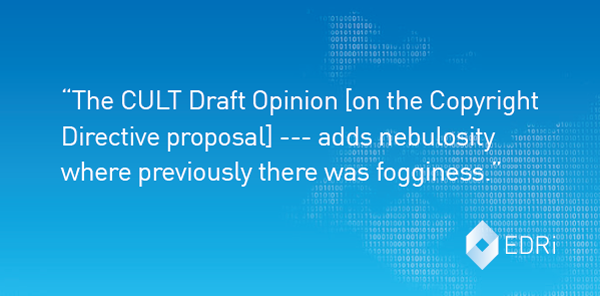Lead Parliamentarian for Culture Committee defends upload filtering
On 6 February 2017, the Parliamentarian in charge of the Copyright Directive for the European Parliament (EP) Committee for Culture and Education (CULT), Marc Joulaud, published his draft Opinion on the proposal for the Directive.
As we described in our previous blogposts (here, here and here) the European Commission’s proposal has not fulfilled hopes for a reform that could deliver a modern, harmonised European copyright framework. The proposal has been disappointing both for not introducing the much needed changes and scary for what it proposes, namely an upload filter for all types of content and the ancillary copyright that failed in two European countries already.
Our main concern relates to the upload filter proposed in Article 13. We analysed the article in detail and summarised the three main problems. The upload filter:
- requires internet companies to install filtering technology to prevent the upload of content that has been “identified by rightsholders”;
- seeks to make internet providers responsible for their users’ uploads;
- gives internet users no meaningful protection from unfair deletion of their creations, because of the bad wording of the proposal for user redress.
The CULT Draft Opinion fails to fix any of these issues: First, in the Amendment (AM) 28 (related to recital 38 of the proposed Directive) the draft Opinion broadens the scope from covering providers hosting a “large amount of works” to “user-generated content, copyright-protected works or other subject-matter actively uploaded or displayed by their users”. This adds nebulosity where previously there was fogginess.
In addition to suggesting an incomprehensible broadening of the already bewildering scope, it does not challenge the implications of the Commission’s proposal which, in essence, argues that, by providing web hosting services, companies “thereby” go beyond being web hosting services. This strange construction is key in the intended destruction of the liability regime for hosting services provided for in the e-Commerce Directive, while claiming in the text that this change is “without prejudice to the e-Commerce Directive”.
Then, changes proposed in recital 39 (AM 29) do not help to clarify the text by replacing “services” with “platforms”, despite Rapporteur Joulaud’s possibly good intention to restrict the wording. A good attempt to fix the proposal in the recitals is found in the next AM 30 (new recital 39a), where the Rapporteur acknowledges that “measures and technologies deployed by digital content platform providers in application of this Directive may occasionally have a negative or disproportionate effect on legitimate content that is uploaded or displayed by users, in particular where the concerned content is covered by an exception or limitation”. In order to counter-balance these real concerns about inevitable restrictions on citizens’ freedoms, the Rapporteur of the Draft Opinion proposes new wording to “strengthen” the redress mechanism in Article 13.2.
Oddly enough, the Rapporteur appoints the rightsholder (not the platform, nor the platform in cooperation with the relevant rightsholder nor, of course, not an independent authority) to be the judge that will “examine and process” the complaints by the user. The proposal also tries to prevent a situation whereby, while the dispute is being settled, a party makes a profit out of content which is not theirs. In order to do that, the proposal establishes that the alleged rightsholder will not be able to monetise the content which is being examined (by the rightsholder) until the complaint has been addressed. This is welcome, as it could help to speed up the process. However, putting the foxhunter in charge of the rules of the foxhunt lacks a degree for credibility. Although the proposed amendment establishes that the rightsholder should “justify” the decision, it is unclear how this “justification” can bring any more legal certainty than the wholly arbitrary proposal of the Commission. Finally, Rapporteur Joulaud adds a new paragraph on AM 76 to propose an alternative dispute resolution mechanism for rightsholders and “digital content platforms” involved, to which the individual user potentially affected by the decision is not consulted.
The text does contain, however, positive proposals such as the new exception for user-generated content (which, however, risks being filtered out as a result of Article 13) and a (sadly incomplete) attempt to include an exception on freedom of panorama (with, of course, this freedom being vulnerable to being negated by the restrictions in Article 13). We welcome that the Rapporteur has acknowledged the importance of these two issues. Now that they are included in the draft Opinion, there is at least the chance of a debate that could make these two proposals stronger and part of the final text from the European Parliament.
In a nutshell, Rapporteur Joulaud has tried unsuccessfully to improve the profoundly broken text of the European Commission but, as the old saying goes, “you can’t make a silk purse out of a pig’s ear”. His attempts to fix the worst parts of the proposal may well be well-intentioned, but unfortunately they do not achieve the goal of making the proposals acceptable, especially regarding to the wording in Article 13. Deletion is the only credible option for the upload filter proposal, just like the proposal for ancillary copyright. Some positive aspects can be found in the draft Opinion but both there and in the rest of the Directive we will need to see much more thorough work to make something good out of it.

Copyright reform: Document pool
https://edri.org/copyright-reform-document-pool/
The copyright reform (02.11.216): A guide for the perplexed
https://edri.org/copyright-reform-guide-for-the-perplexed/
C4C: CULT Opinion on the Copyright in the Digital Single Market Directive: bad on filtering, press publishers’ rights and TDM, but putting users back in the picture! (13.02.2017)
http://copyright4creativity.eu/2017/02/13/cult-opinion-on-the-copyright-on-the-digital-single-market-directive-bad-on-filtering-press-publishers-rights-and-tdm-but-putting-users-back-in-the-picture/
Limiting the snippet levy to commercial use is tangling up an already muddy issue (10.02.2017)
http://www.communia-association.org/2017/02/10/limiting-snippet-levy-commercial-use-tangling-already-muddy-issue/

